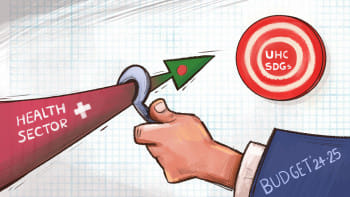Unveiling the struggles of Bangladesh’s pharmaceutical representatives

The pharmaceutical industry, a crucial pillar of our healthcare system, is marred by exploitative practices that push employees to their limits and compromise ethical standards. Medical or pharmaceutical sales representatives, often from lower-middle-class or poor families, are forced to work gruelling hours—from early morning until midnight, with minimal breaks and very few days off. Despite their exhaustive schedules, they receive no overtime pay and live under constant threat of job loss. They run themselves ragged, yet their efforts go unrecognised and unrewarded. Rather, they are pressured to meet unrealistic sales targets, which drives them to engage in activities that are both morally questionable and legally dubious.
One of the most alarming practices among medical representatives is that they take unauthorised snapshots of patients' prescriptions. This act of invading patients' privacy is driven by the companies' relentless pursuit of market dominance. Representatives, fearing job loss, are forced to comply, even though they know it is wrong. While many patients are unaware that their medical information is private, some do not even notice when that very information is captured by medical representatives and shared. As a result, patients' right to privacy is violated in their most vulnerable moments. This practice not only breaches ethical standards but also potentially violates privacy protections, making a mockery of patient confidentiality.
Direct interviews with over ten medical representatives from leading pharmaceutical companies reveal the extent of this malpractice. One representative lamented, "We are forced to take at least 30 snapshots daily and send them to our supervisors. It's humiliating for us and distressing for the patients." Another representative stated, "We know it's wrong, but the fear of losing our job compels us to comply."
The pharmaceutical companies further tarnish their reputation through manipulative marketing tactics. They lavish doctors with high-value gifts, money, and other incentives to sway their prescribing habits. These inducements are dressed up as promotional activities or marketing strategies, but in reality, they corrupt the medical profession. Doctors, influenced by these rewards, may prescribe certain medications that may not be the best option for the patient but would benefit the doctors personally. This practice leads to the over-prescription of drugs, particularly antibiotics, which contributes to the broader public health crisis of antibiotic resistance.
The ethical compromises do not end there. Pharmaceutical companies often set unattainable sales targets for their representatives, knowing full well the pressure it exerts on them. When representatives fail to meet these targets, they face severe consequences, including job loss or increased workloads without additional compensation. The stress and fear of these repercussions drive representatives to cut corners, engage in unethical practices, and prioritise sales over patient welfare.
Interviews with several medical representatives shed light on this oppressive environment. One senior representative shared, "We are given impossible targets and threatened with termination if we don't meet them. It's a constant state of stress." Another representative added, "The company invests heavily in doctors to push their products, and we are caught in the crossfire. If we don't deliver, we are out."
The ripple effects of these unethical practices extend far beyond the pharmaceutical industry, undermining the entire healthcare system. Patients lose trust in their doctors, knowing that their prescriptions might be influenced by corporate incentives rather than medical necessity. This erosion of trust can lead to patients being less likely to seek medical help when they need it, exacerbating health problems and increasing the burden on an already strained healthcare system.
Moreover, the over-prescription of antibiotics and other medications can have dire consequences. Antibiotic resistance is a growing global threat, and Bangladesh is not immune. When antibiotics are prescribed unnecessarily, bacteria can evolve to resist these drugs, making infections harder to treat and increasing the risk of disease transmission, severe illness, and death.
It is imperative that we address these issues through robust policy reforms and stringent enforcement of labour laws. The government must enact and enforce regulations to protect workers' rights, ensure fair compensation, and regulate working hours. Privacy laws need to be strengthened to safeguard patients' personal information and restore trust in our healthcare system. These measures are the first steps toward righting the ship and steering the country towards a more equitable future.
Employers must also step up by providing mental health support and fostering a culture of transparency and ethical practices. The exploitation of employees must end, and companies should be held accountable for their actions. It's high time that these corporate giants realise that they cannot make a silk purse out of a sow's ear by exploiting their workforce.
The formation of unions or worker associations can empower employees to advocate for their rights and negotiate better working conditions. Training and development programmes should be provided to help workers transition to new roles or industries with more opportunities for growth and stability. Giving workers a seat at the table is crucial for driving meaningful change.
The path to a prosperous Bangladesh lies in the fair and ethical treatment of its workforce. It is time for the government, corporate sector, and civil society to unite in addressing these issues and creating a work environment that is just, supportive, and conducive to the well-being of all employees. Only through collective action can we ensure that our nation's brightest minds are given the opportunity to thrive and contribute to our shared future.
Mostafijur Rahman Mamun is MBA student at Central Michigan University, USA. He can be reached at [email protected].
Views expressed in this article are the author's own.
Follow The Daily Star Opinion on Facebook for the latest opinions, commentaries and analyses by experts and professionals. To contribute your article or letter to The Daily Star Opinion, see our guidelines for submission.

 For all latest news, follow The Daily Star's Google News channel.
For all latest news, follow The Daily Star's Google News channel. 










Comments